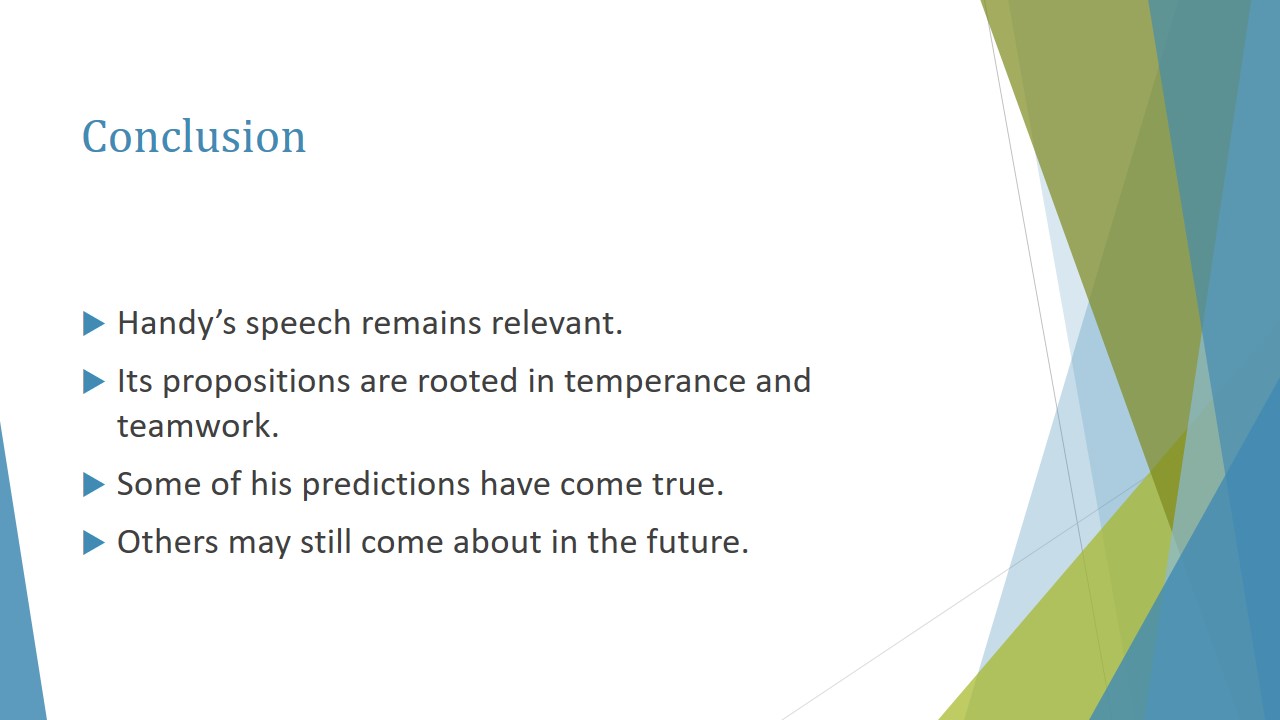Introduction
- Handy presents a speech for managers.
- His discussion offers propositions for the next 25 years.
- It addresses the period from 1996 to 2021.
- In 2019, we can see how these ideas were or were not implemented.
In his speech, Charles Handy discussed the state of business and the job market in 1996, offering his thoughts about the upcoming 25 years. Now that this period of time is coming to an end, one may critically analyze the points that the philosopher made. It is also possible to compare the author’s ideas with those that are visible in modern societies. The author discusses jobs, companies, and capitalism as well as people, talents, money, and education, and he shows how the major issues of humanity are interconnected. One can also employ different philosophies to evaluate the concepts that Handy believes in, including Utilitarianism, Value Theory, Kantian theory, and Egoism theory.
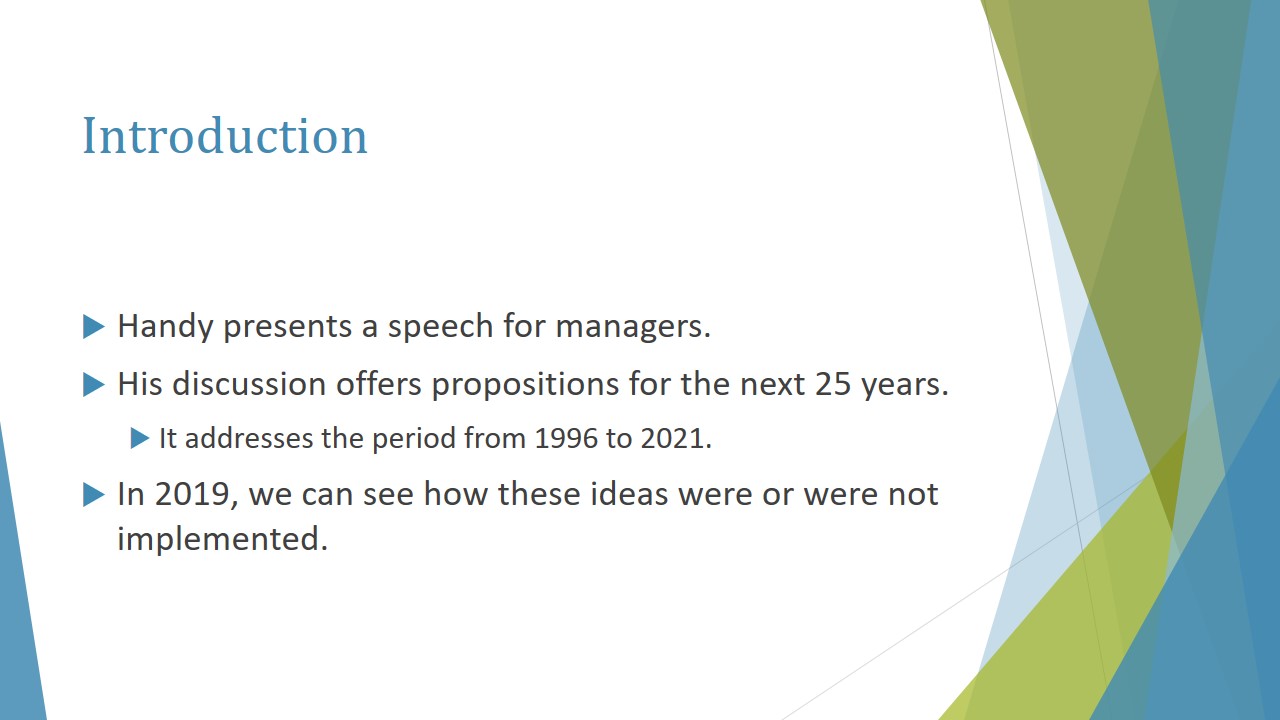
Critical Summary: What Sort of Jobs?
- Job force, as predicted by Handy:
- 50% – full-time employees.
- 25% – part-time workers.
- 15% – self-employed individuals.
- 10% – unemployed or in training.
- The increase in self-employment and freelancing requires people to possess soft skills and a level of awareness about their personal talents.
According to Handy, the job market would continue to shift towards a decrease in the share of full-time jobs. The philosopher stated that companies needed to hire fewer people in order to keep up the growth of their profits. Therefore, full-time positions would have to be reduced, thus contributing to the growing number of part-time jobs, project-based positions, and self-employed people. Indeed, many companies now work with freelancers who do not have similar protections, benefits, or stability. These people, as prophesized by Handy, are not educated by the company but through their own means.
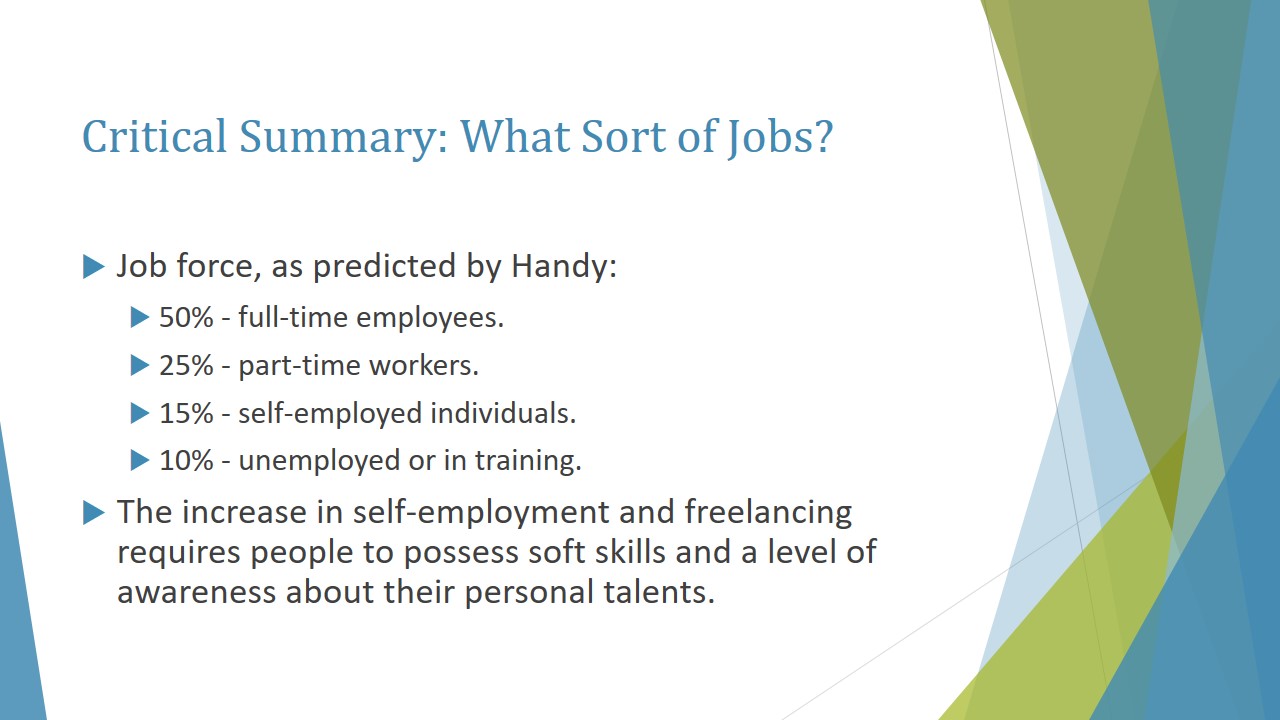
Critical Summary: What Sort of Companies?
- Companies grow continuously through acquisition and merger.
- Federalism – the dissemination of authority to manage large corporations.
- Example: International Postal Federation.
- Where is the central office?
- Each subsidiary is equally important.
- The center as a whole follows agreements between its parts.
Handy argued that companies would increase in size by using technological advances to create international systems. As the same time, all businesses would have to become smaller. Here, Handy introduced the principle of federalism – the distribution of power from one entity to multiple smaller units. The author, however, rejected the idea of a “Superstate” that had one or multiple strong centers. Instead, the idea was to disperse authority among people interested in the company’s profitability. Currently, many companies are international, and a significant number of them dominate their industries by buying or undermining their competitors.
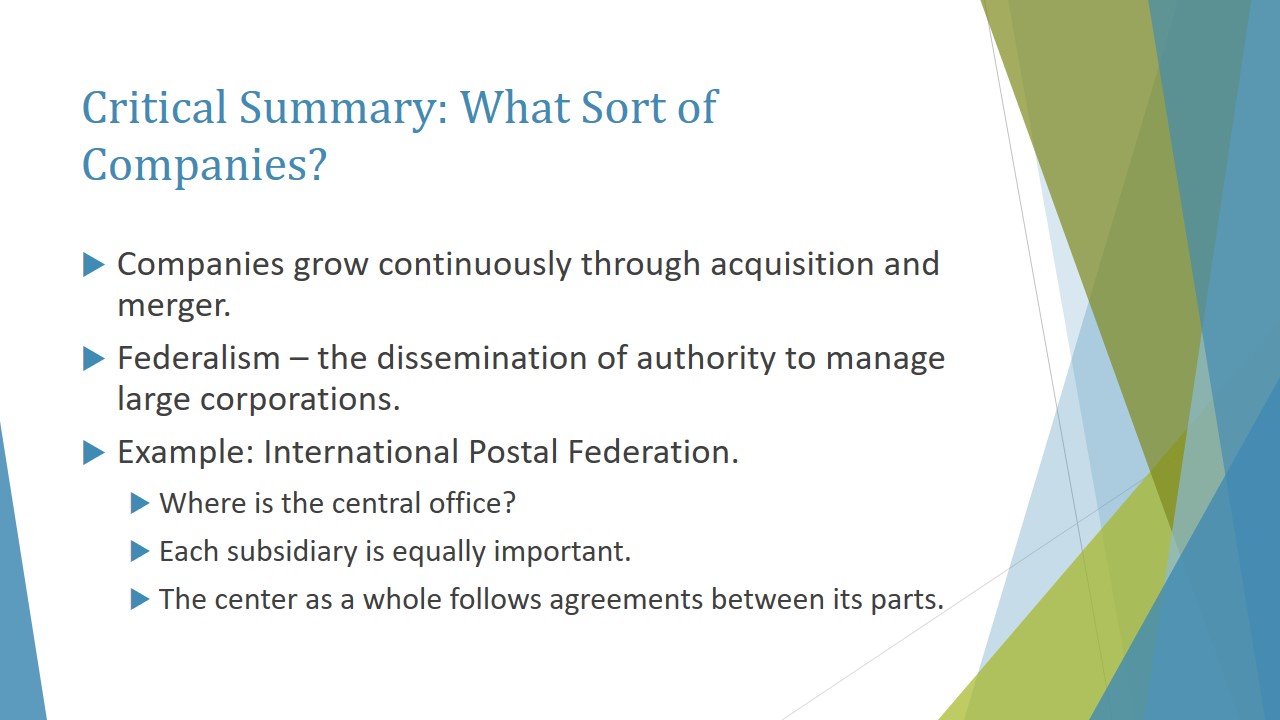
Critical Summary: Trust Is Cheap
- Employees can work without constant supervision if they are motivated by:
- Owning company shares.
- Contributing to the discussion.
- Gaining profit from the business’s success.
- Trust is vital in virtual firms where workers do not see each other.
- Mistakes are a component of the learning process.
Companies that have offices in different cities, use virtual spaces, or employ freelancers need to address the issue of trust. Handy argued that businesses could not successfully grow without believing that workers could do their jobs without continuous supervision. Thus, it would be easy for firms to function in small units where people were well-acquainted with each other. Another vital part of trust is the right to make mistakes. Handy stated that companies could devote additional time to educating workers about their organizational processes and then allowing them to self-manage. At the present moment, many firms are collaborating with remote workers who rely on themselves and are only limited by deadlines and a set of company guidelines.
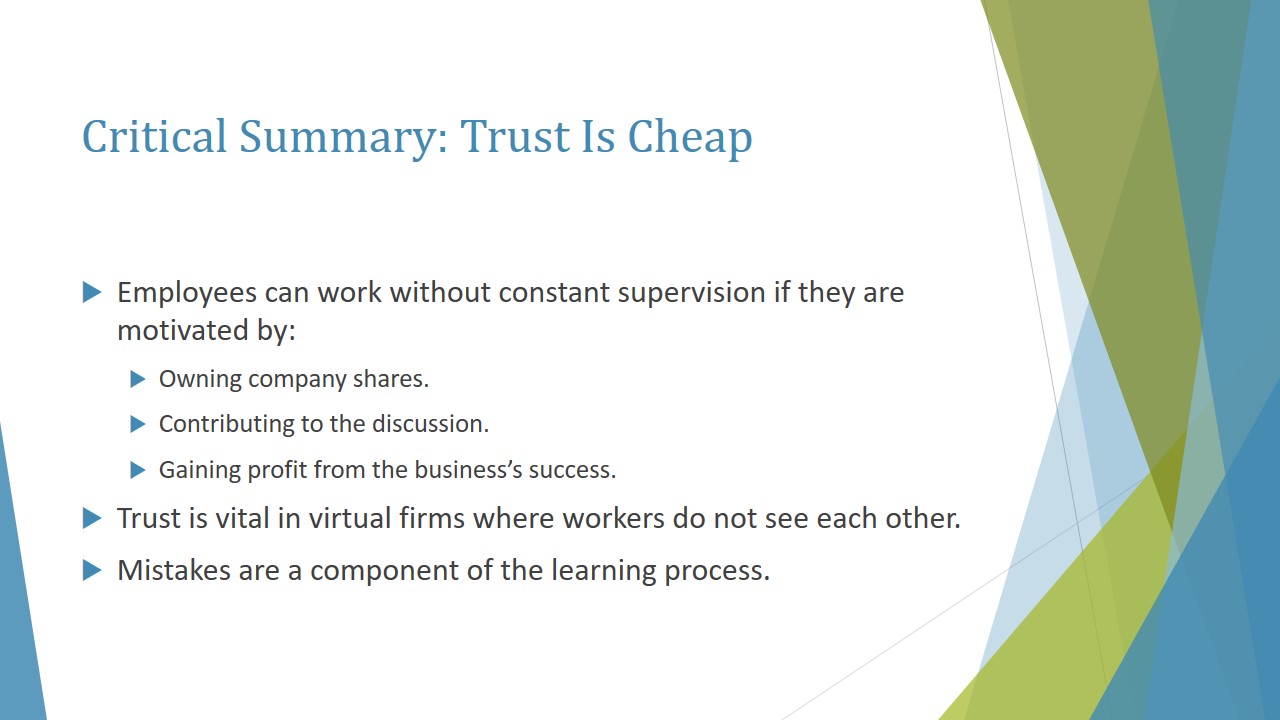
Critical Summary: What Sort of Capitalism?
- People are the company’s assets because of their skills and talents.
- Tangible assets have less impact on organizations’ success than employees.
- Socialist principles may motivate people and redistribute wealth.
Handy argued that the standard model of Anglo-American capitalism would not work on its own in the future. Therefore, he advised the integration of socialism into business processes to include the idea of “sympathy” for others. As people come to be considered the main assets of many firms, their place in companies changes. If a valuable talent leaves the business, it may substantially affect the organization’s success. It is not practical to treat employees as property, limiting their access to profits. The example provided by Handy, a list of America’s richest men, shows that the current situation is similar to that of 1996. The divide between the rich and the poor is still significant, which shows that Handy’s idea did not reach its fulfillment.
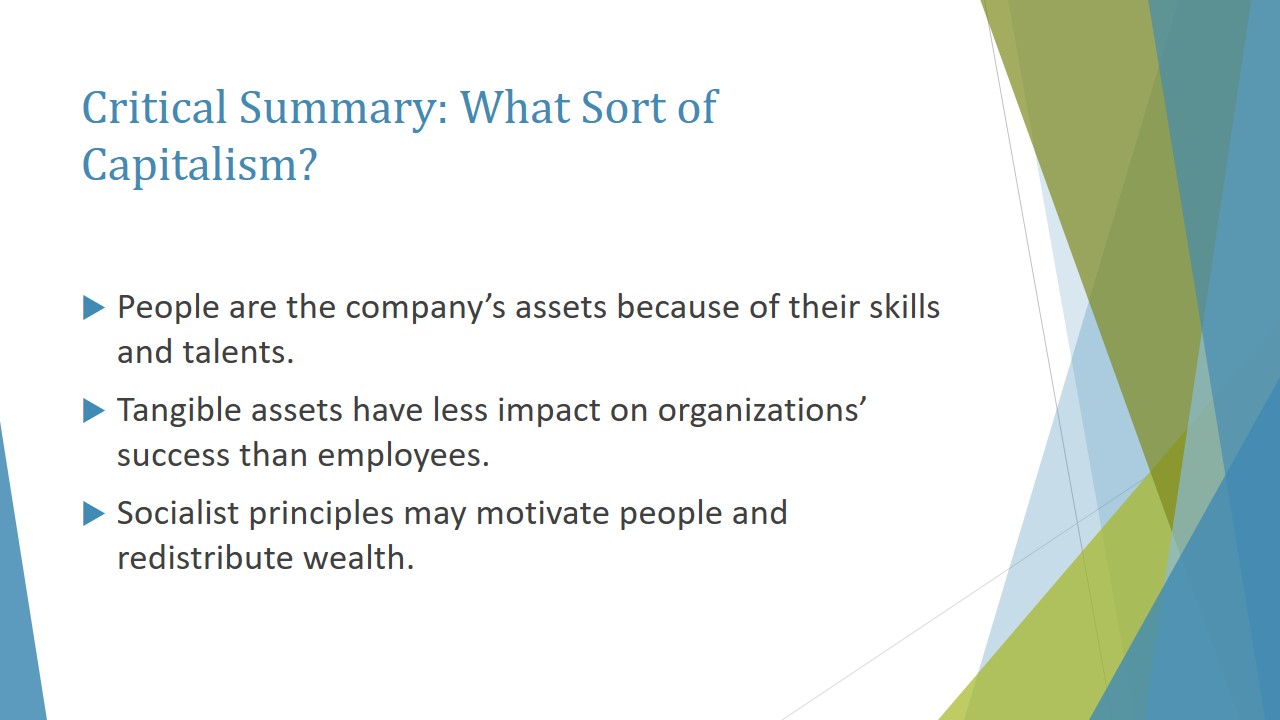
Critical Summary: What Sort of Society?
- First possibility: 20/40/40 society:
- 20% of people are well off.
- 40% of people make barely enough to live.
- 40% are excluded individuals.
- Second possibility: service age:
- Narrow niches for people with unique talents.
- Self-employed entrepreneurs who develop a particular skill.
- Independence from conventional education.
Handy believed that society would move away from mass production into a period focusing on of services. He stated that making money out of nothing would be simpler for people who discovered their unique skill and found a niche. Therefore, increased attention would be given to various needs, and new businesses would appear based on demands that had not yet been explored. The philosopher also noted that the existing paths to education were not essential for people to achieve success since skills could come in all forms.
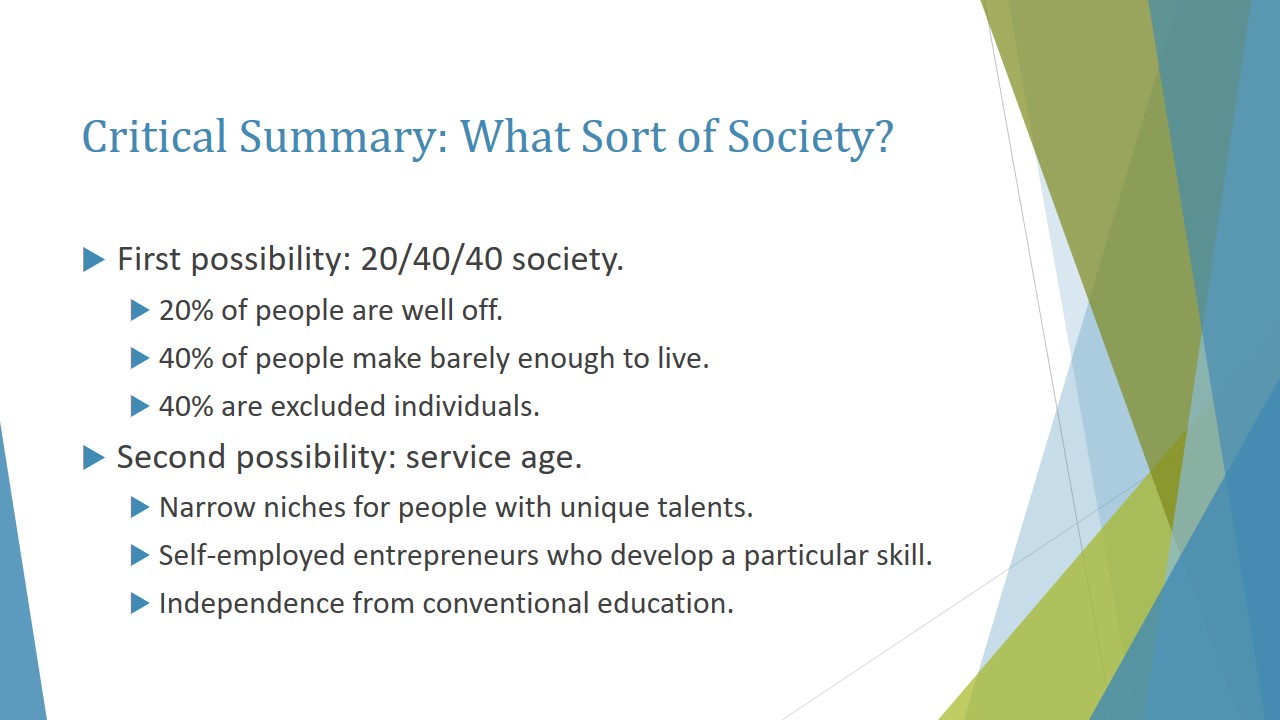
Critical Summary: What Sort of Education?
- The current educational system:
- Failure on a test is permanent and impactful.
- Exclusion of people who do not succeed immediately.
- Final results are not personalized to students’ abilities.
- Handy’s proposed system:
- Failure is not punished, and tests can be retaken.
- Students’ competencies are tracked and recorded.
- Upon leaving school, people are aware of their individual strengths.
As mentioned previously, Handy did not believe in the effectiveness of the existing system of education. Instead, he proposed a different model that would address the existing shortcomings. In the speech, the philosopher opposed the focus on relative success or failure that is enforced by tests and examinations. A model that could work would be based on people’s unique capabilities and the option of taking tests whenever a person feels ready. The competencies of students would become the priority, and the recognition of their personal skills would allow them to represent themselves in the market or in the world as a whole.
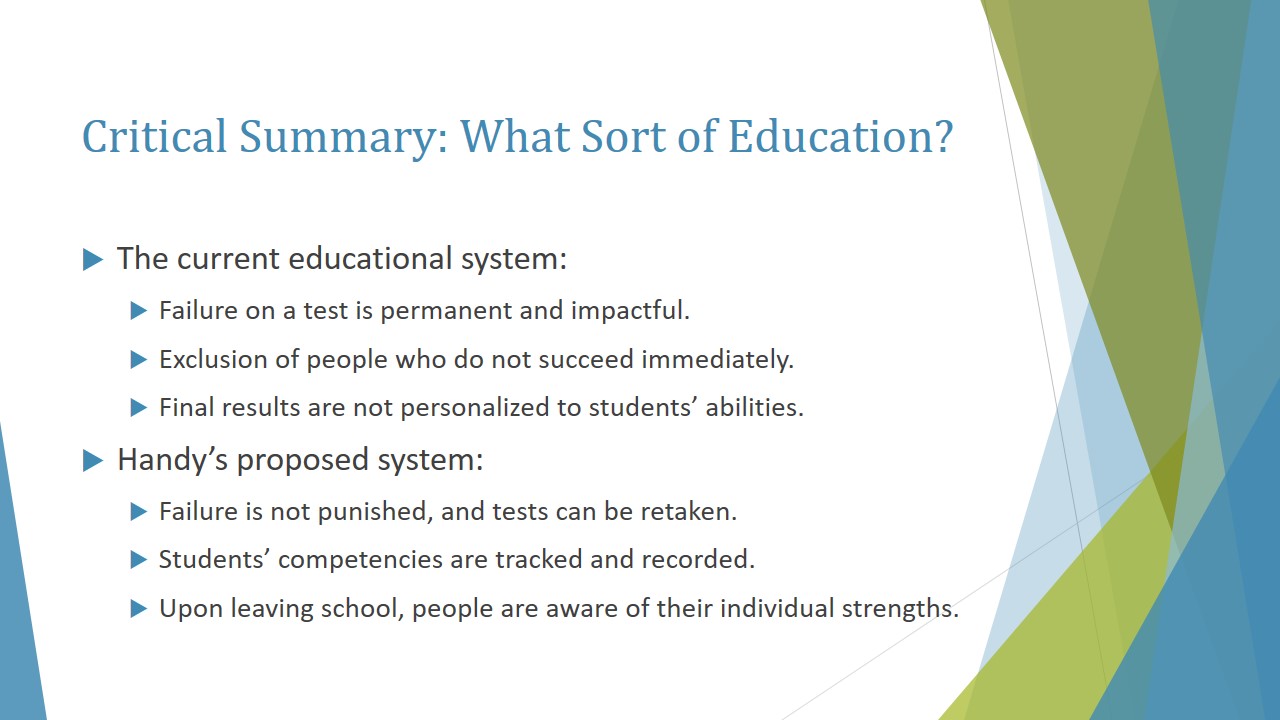
Critical Summary: What Sort of Life?
- Stages of life:
- First 25 years – apprenticeship.
- Second 25 years – work and creation of a family.
- Third 25 years – time for self.
- Fourth 25 years – preparation for and acceptance of death.
- “More” – a flawed measure of success:
- Success is unreachable.
- All pursuits end in failure.
- The process yields no satisfaction.
Handy used an idea from Hindu philosophy that separated people’s lives into four 25-year stages. According to this idea, people’s work should change after they reach 50 years. Employees need to be prepared to leave their jobs and explore other interests by this time, and companies have to accommodate people’s desire to do that. Moreover, Handy stated that people have to understand such concepts as “More” and “Enough” in order to live a meaningful life and pursue the goals they value. The idea of “More” does not see any limit to earnings or riches, making true success virtually unreachable. Instead, people are always reminded that someone can surpass them if they stop working.
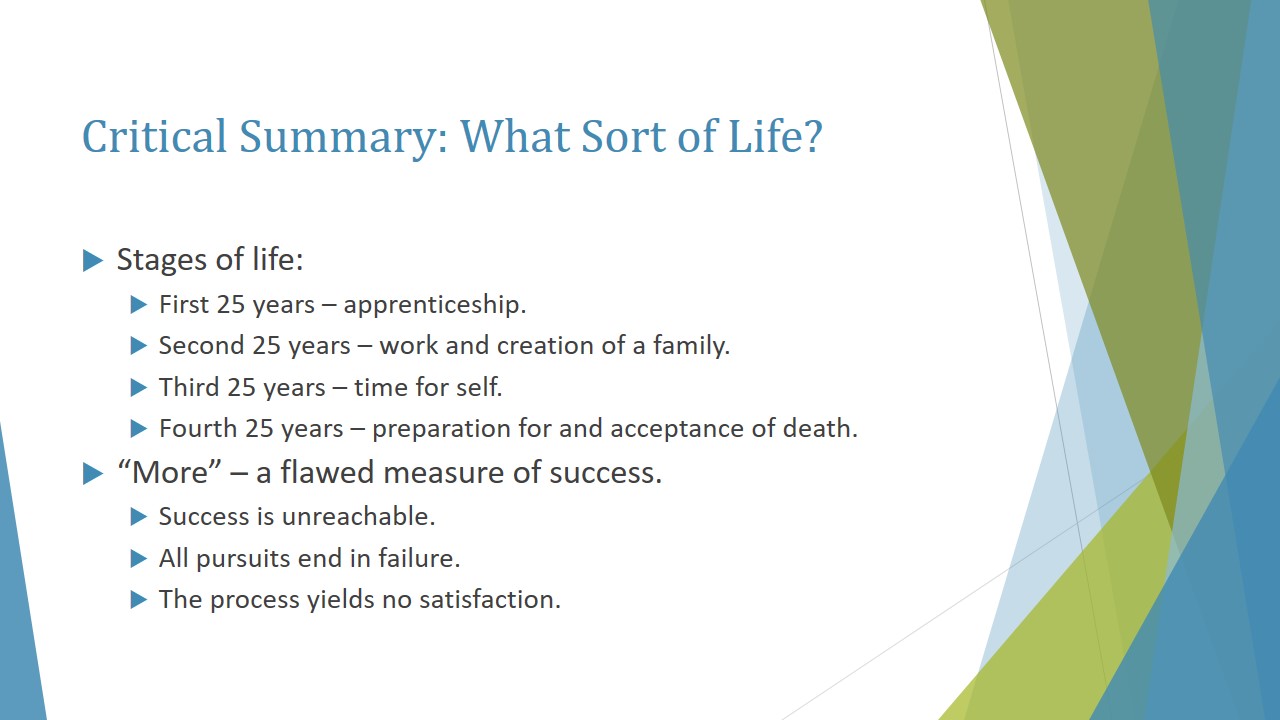
Critical Summary: The Doctrine of Enough
- An antithesis to “more.”
- “Enough” serves as a limit for achieving success.
- After getting enough, one may move on to something else.
- The doctrine opens up opportunities for self-discovery.
- If people have enough, they do not feel the need to compare their resources.
The opposition to the idea of “More,” proposed by Handy, is the Doctrine of Enough. It states that a person should be able to find the limit that would satisfy all their needs, and then work to achieve it, but not surpass it. In this case, the doctrine offers a solution to the problem of focusing too much on work, money, or success and ignoring other parts of life as a result. “Enough” is a concept that gives people the ability to find themselves without sacrificing time to gather more power or resources that may be necessary for comfortable living. This idea corresponds to the previous propositions for raising individuals’ self-awareness of their personal skills. It is impossible to measure whether this concept has affected the current job market, but it is clear that the majority of people have not embraced this doctrine yet.
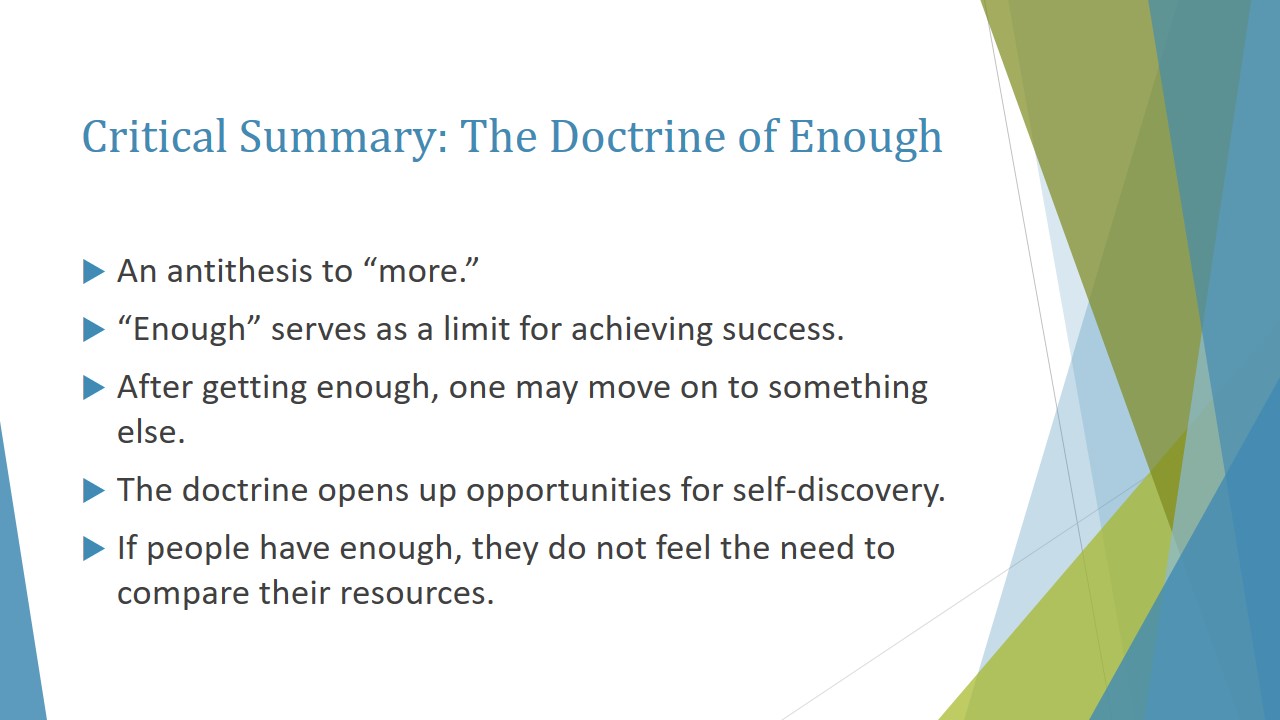
Ethical Theories: Utilitarianism
- The choice is ethical if it results in the best outcome for the most people.
- Socialism in companies promotes employees’ contributions.
- Handy’s system of education praises everyone’s skills.
- The Doctrine of Enough makes success reachable.
According to the theory of Utilitarianism, the most ethical choices are those which produce the maximum amount of good for the largest number of people. Handy’s beliefs align with the ideas of this philosophy. For instance, his proposal to introduce federalism into companies’ structures can lead to workers’ gaining profits that would otherwise stay in the circles of owners and upper management. Therefore, a larger number of people (employees) would have enough resources to live comfortably. If one takes the ability to explore one’s potential as a measure of happiness, then the Doctrine of Enough is also supported by Utilitarianism. If competition and envy are limited in the job market, more people would be less stressed about their achievements.
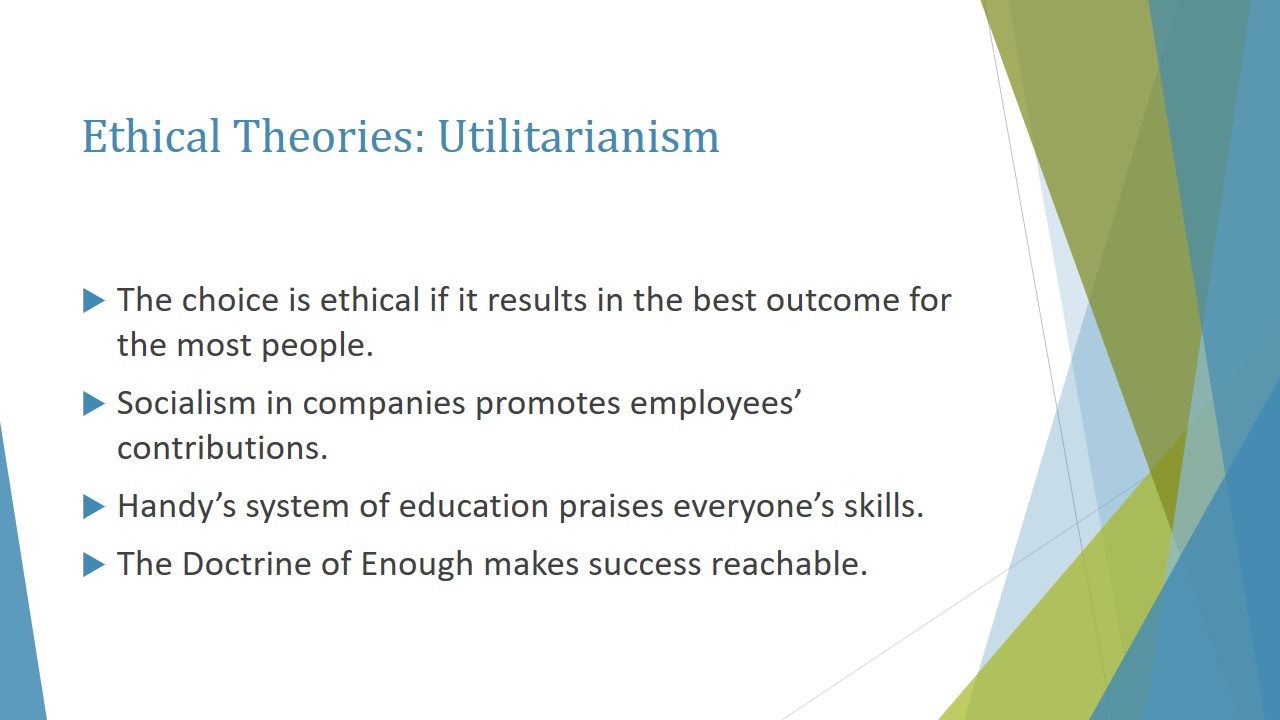
Ethical Theories: Virtue Theory
- People possessing virtues make ethical decisions.
- Possible virtues:
- Justice;
- Temperance;
- Bravery;
- Prudence;
- Fidelity;
- Self-care.
This theory holds that moral actions are performed by people who possess cardinal virtues. Such qualities as prudence or temperance are among the ones that are emphasized by Handy’s rhetoric. The philosopher’s Doctrine of Enough is based on people’s ability to enjoy life in moderation and overcome the desire to acquire more resources than may be necessary. His beliefs about the redistribution of wealth are in line with such virtues as justice and fidelity – the idea of “sympathy” he introduces promotes care for others. Finally, the Hindu stages of life discussed above are also supported by the virtue of self-care, which states that people have a duty to care for themselves.
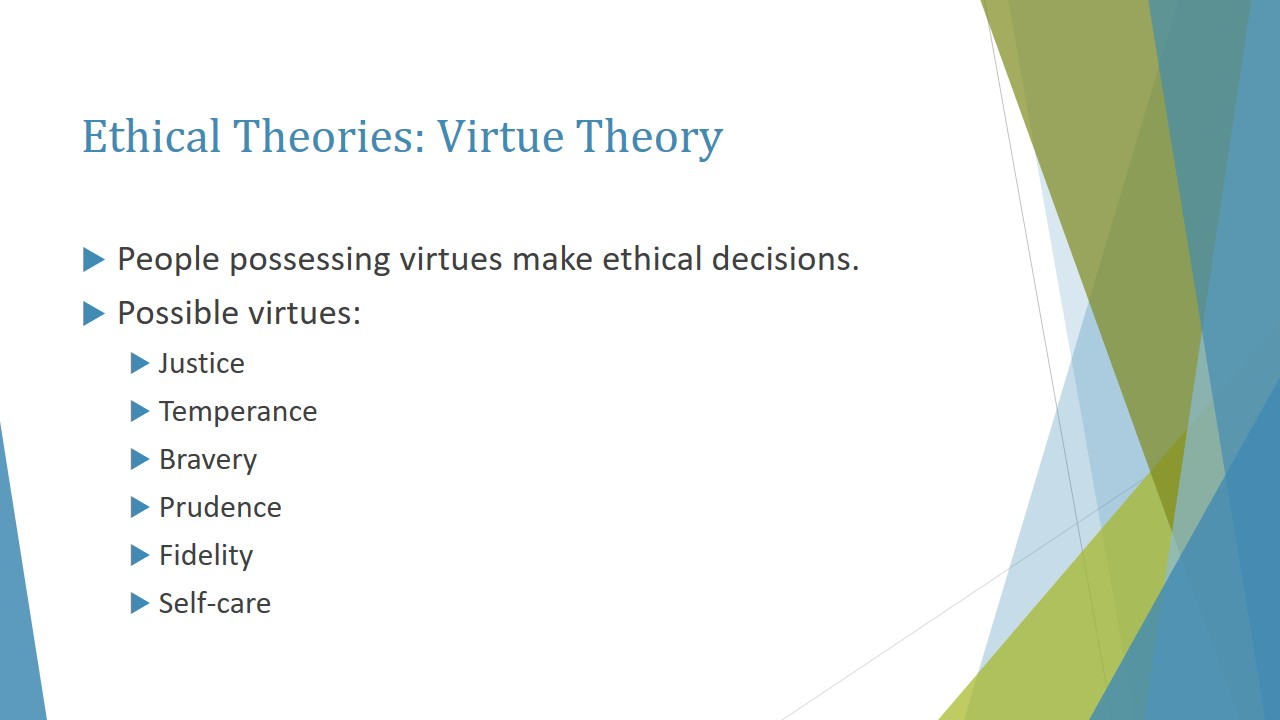
Ethical Theories: Kantian Theory
- Kantian ethics operate on the basis of duty fulfillment.
- Actions are morally right if they are performed following a categorical imperative.
- In this case, the imperatives are:
- Not to contribute to the inequality of wealth.
- Not to damage the environment.
It may be more challenging to assess Handy’s propositions since his speech was addressed to a large number of people. Thus, his ideas may be cited by people with different intentions, even if these persons come to similar results. The philosopher’s personal view shows that he both wants people (including himself) to find comfort and satisfaction through their personal skills. Moreover, some of his educational and workplace policies originate from a desire to help the world economy to progress without leaving people without jobs. While he shows that companies would need to decrease their number of full-time positions, he introduces a model that would still offer people new jobs.
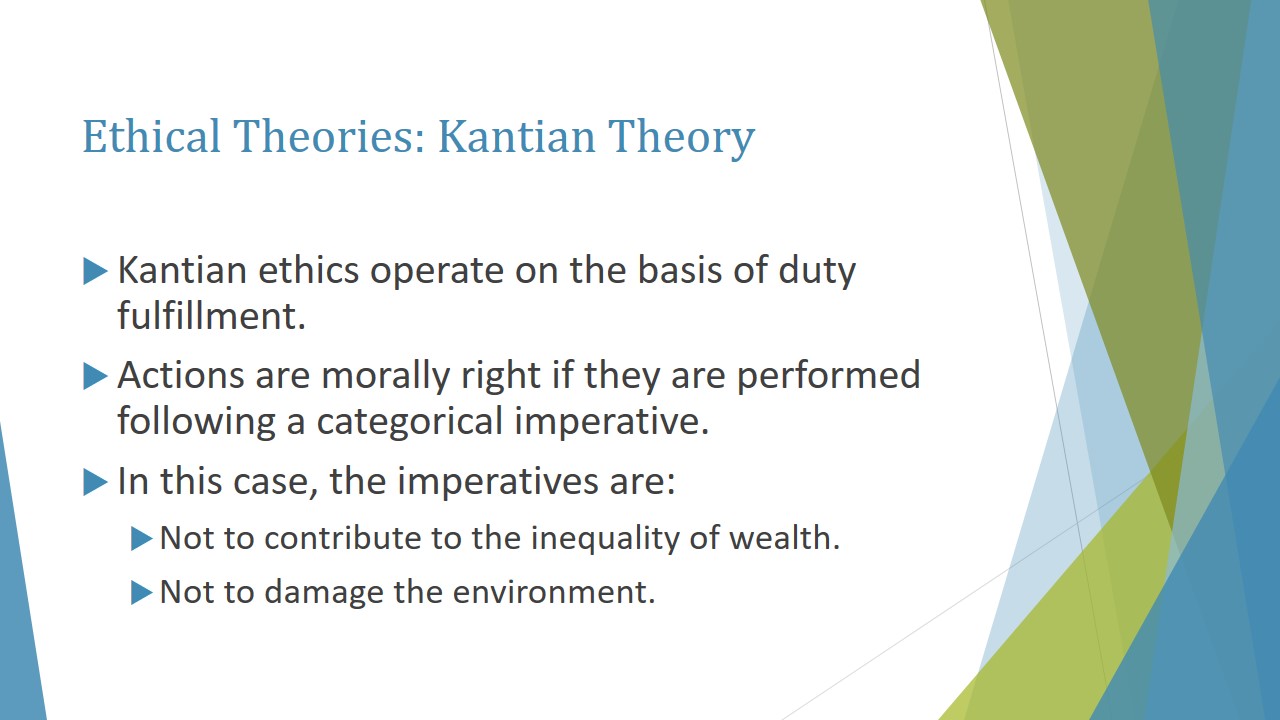
Ethical Theories: Egoism Theory
- Self-interest is the only reason for any pursuit.
- Egoism could support Handy’s propositions if:
- They will lead to success.
- People will understand the outcomes of these actions.
The ethics of egoism somewhat differ from many beliefs that Handy expressed in the speech. His idea of adding socialism to the capitalist system may be viewed negatively by business owners who wish to continue as the primary authorities in their companies. In contrast, one could argue that this suggestion would lead to a firm’s success, which could be interpreted as an egoistic goal. Handy’s argument for trust and mutual effort may align with the Egoism theory if people realize that teamwork can be justified by self-interest. Here, the comparison of “More” and “Enough” emerges as a decisive factor in determining which one is considered preferable.
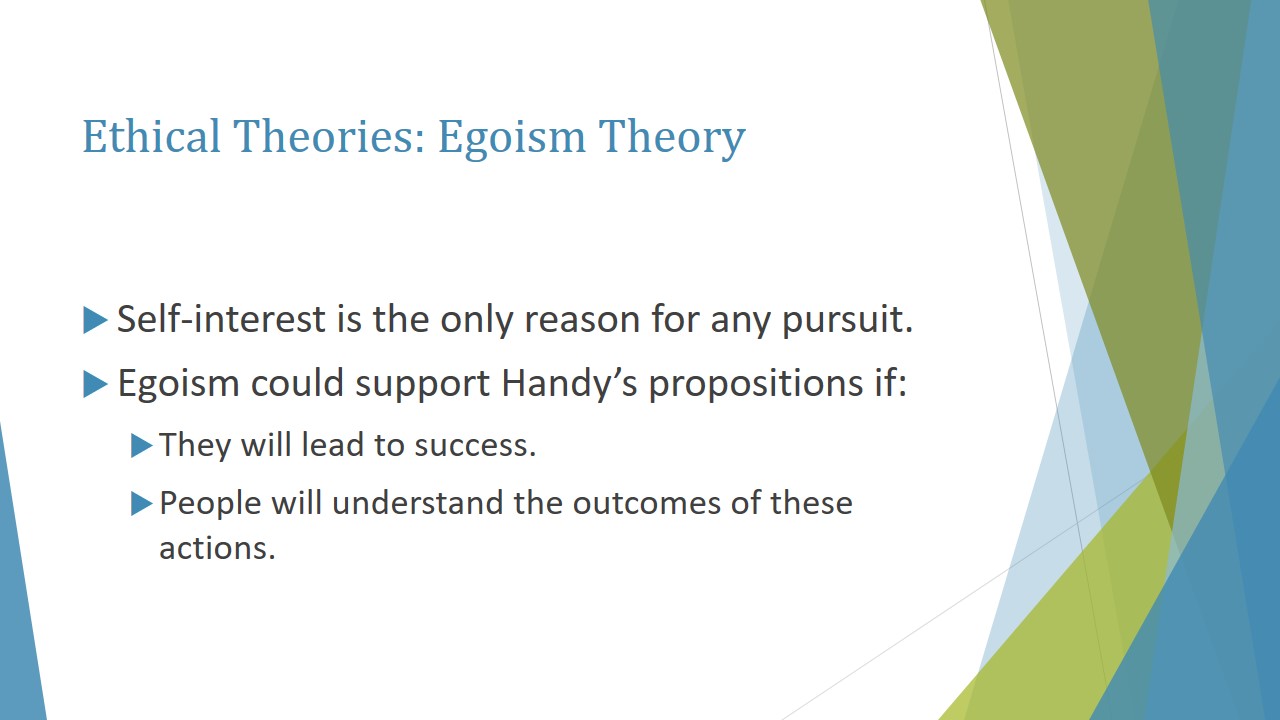
Conclusion
- Handy’s speech remains relevant.
- Its propositions are rooted in temperance and teamwork.
- Some of his predictions have come true.
- Others may still come about in the future.
In 1996, Handy was able to recognize some problems with the job market and society that were then common. He proposed many solutions and shared his vision for the future. Some of his views can be recognized at the present moment – the workforce is shifting towards digital freelance employment. Others have not been realized since income disparity and testing in education still exist. Some of the concepts introduced by Handy should be considered even now as they remain relevant to contemporary issues.
